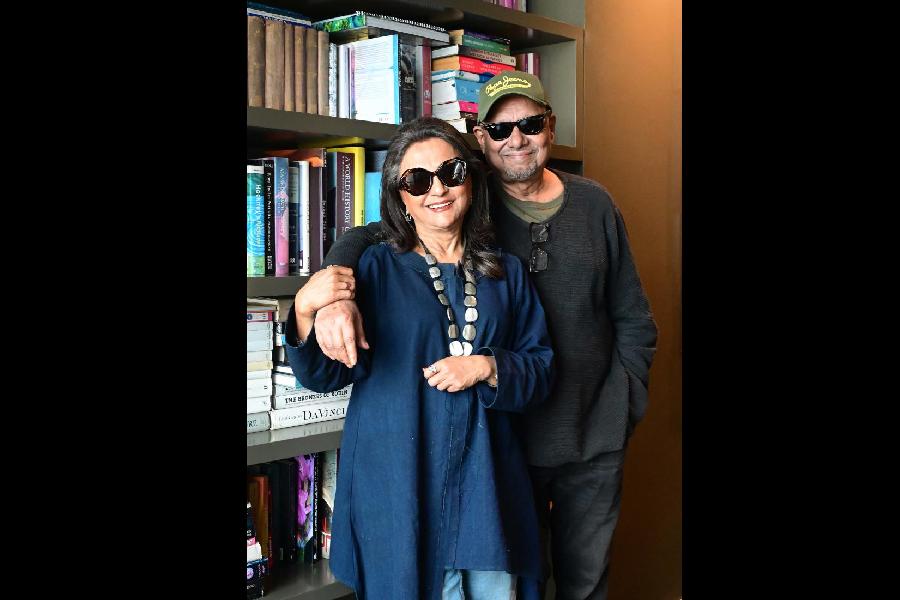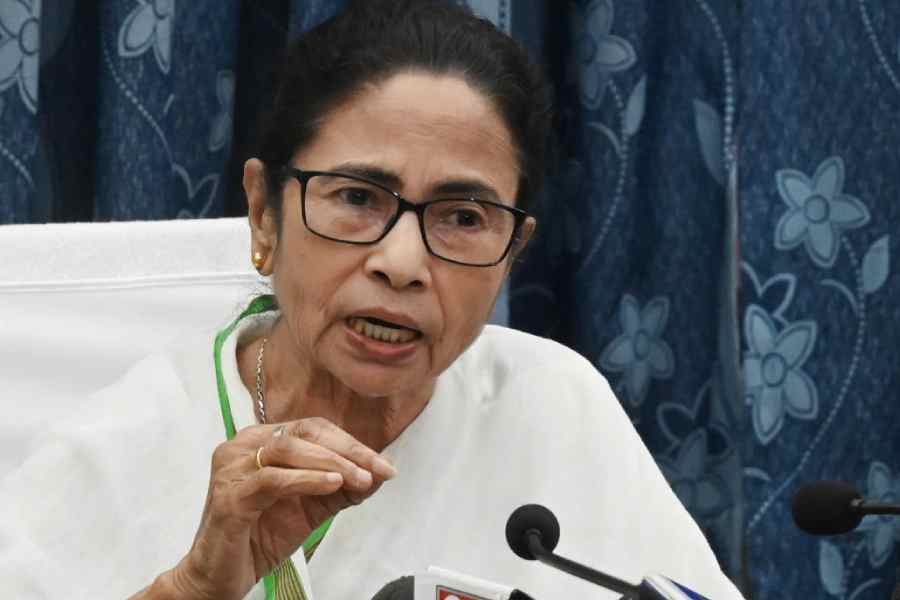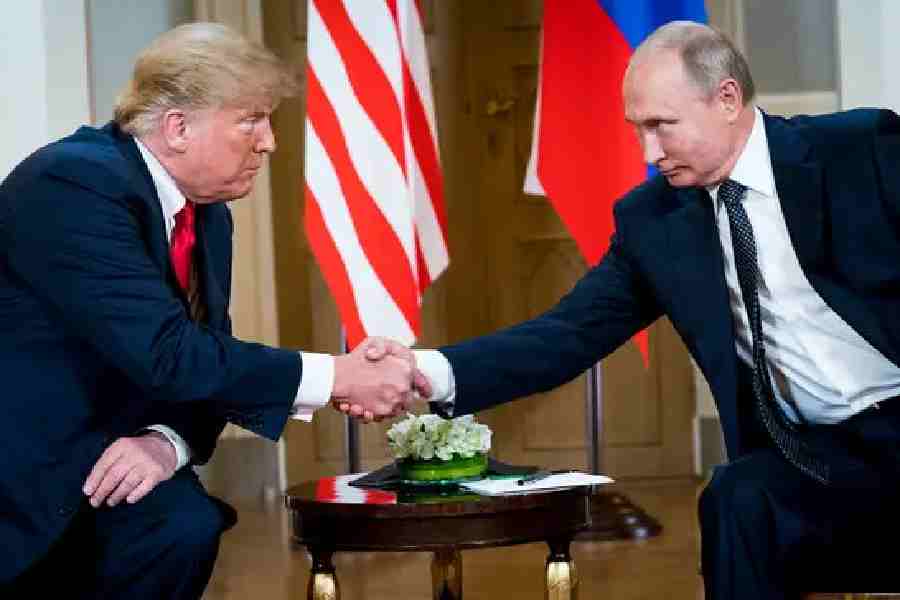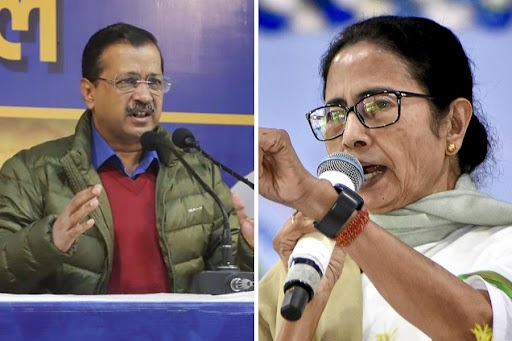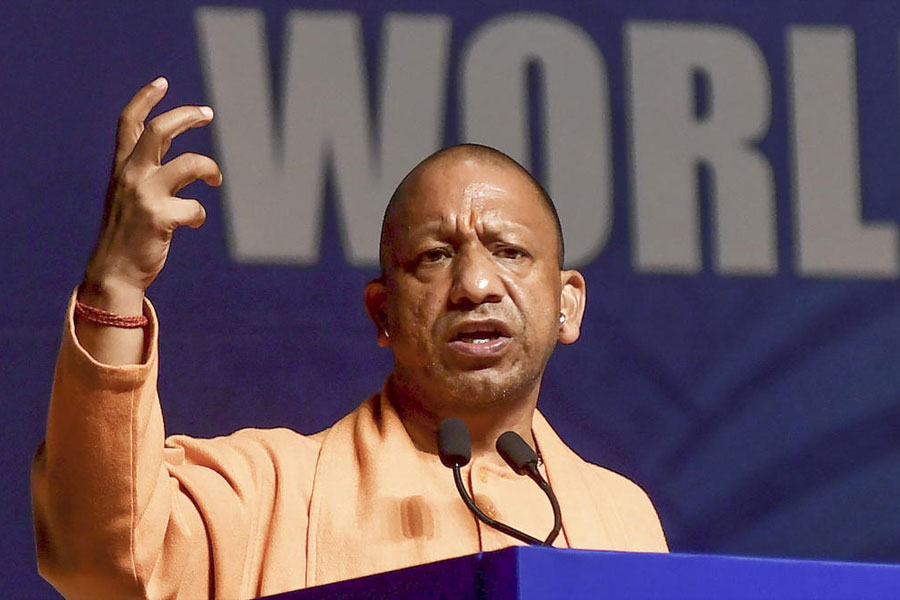Parambrata Chattopadhyay’s film Ei Raat Tomar Amaar, starring Aparna Sen and Anjan Dutt, premiered at the 30th Kolkata International Film Festival last year. The film, which received a standing ovation, narrates the story of an elderly couple as they navigate regret, heartbreak, love, and forgiveness in their 50 years of marriage, all in a single night. Ahead of the release on January 31, Aparna Sen and Anjan Dutt, who are paired for the first time, talk to t2 about the film.
Do you both remember your first meeting?
Anjan: It was at her earlier house in Alipore. She was reading out a film script to some of her friends and it was called What the Sea Said. I was very excited to see her and she greeted us. I think the script was supposed to be made in Hindi. She had already decided on Shabana Azmi and Naseeruddin Shah to play the characters. It is a strange coincidence that many years later that film happened in Bangla and it was called Juganta. It is also about the star Aparna Sen reading out the script to people who will not be a part of her film. It is a practice that used to happen back then and it is sad that it no longer happens.
Aparna: I vaguely remember this… I know that it was before Juganta that I met him. I had obviously been in Mrinal Sen’s films and have seen him. But it was during Mahaprithibi that I kind of zeroed in on him.
Did your first impression of each other change when you got to know each other personally over the years?
Anjan: I don’t think it changed. I came from a background where I was very well-informed. And because I was aware, I knew that for some people it was beyond their star appeal.
Aparna: Our film Juganta was a milestone in all of our lives — Anjan, Rupa (Ganguly), Sohag (Sen) and I. That was the time we really got to know each other well as people. Initially, Anjan and Rupa to me were Deepak and Anasuya. Our film was shelved for a year. I was in New Jersey and at night I would suddenly wake up and say that I am missing them dreadfully. My husband would ask — ‘Who?’ I would say Deepak and Anasuya. (Laughs) Then Anjan started singing and I incorporated that in my film. I think it was more when I discovered Anjan as a singer and a lyric writer that somehow I understood him better as a person. Before that he was an actor. A very good actor but an actor.
Whatever distance was there went way through our film’s workshops and discovering him as a singer and a songwriter. We gradually got to know each other’s families. They became like family friends. I would go to Anjan’s plays and that also revealed a lot to me about the person. The way he plays his characters in Van Gogh or Death of a Salesman tells me a lot about him as a person, and his empathy, which is a very important thing to me. Then we discussed each other’s films. He wrote about me and I wrote about him. And that grew over the years.
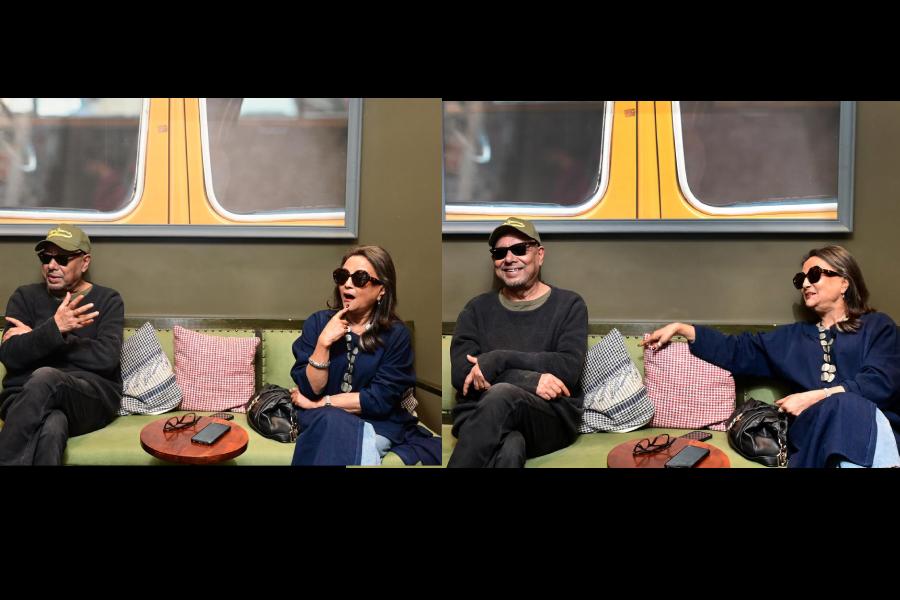
Were you able to critique each other?
Both: Yes absolutely…
Anjan: I also want to share something… there was a gig that I did where I invited some people including Aparna Sen and she came with a few of her friends and it was there that she told me that I would be very popular.
Aparna: There was a lightness of touch. The way he delivers his lyrics without underlining. The way he acts... it is always underplayed with a touch of humour. There’s no underlying message in his films. I am comfortable with all of these.
Another side of Anjan is very endearing. We had gone to Kalahandi to shoot. I remember we were returning in a jeep, the back of which could be opened and because the sky was very clear after the rains, it was enchanting. I laid back with my head sticking out of the back of the jeep. And then we watched the stars. I still remember that.
Anjan: It could be dangerous but it was beautiful.
Aparna: I remember that as one of the high points in my life as it was a moment when I could let go of myself completely and I forgot that I was the director and he was my actor! (Laughs) I was supposed to be more responsible. I was like a little girl… it was stunning. That’s a memory that I remember and wanted to use in a film as an image. That also revealed a side of Anjan. He could also let himself go. For a person to be able to do that is great.
Anjanda, you have acted in her films and you share the screen in Ei Raat Tomar Amaar. Did you ever think of directing her?
Aparna:(Laughs) Now here’s a moment of contention!
Anjan: No no... one of the best things about her is her sense of wit and humour. And that’s very Bengali about her. Bengalis have it in them… there’s Sukumar Ray…
Aparna: And Shibram Chakraborty…
Anjan: Yes. Humour needs to be underlined in our films. That wit and humour of hers really attracted me as a director, as an actor and as a person. Humour is something which we are losing. It is not just something funny. It has got to do something with an understanding of life and I have always enjoyed it. I wanted to do a comedy with her and I wrote a script but it involved so many other things…
Aparna: I will still do it if he takes me!
Anjan: I can do it anytime but the budget...
Aparna: I would love to do it. I love comedies. It is such an endearing character that I really want to play her so much. She is very funny and she is very sweet. I keep urging Anjan to do it.
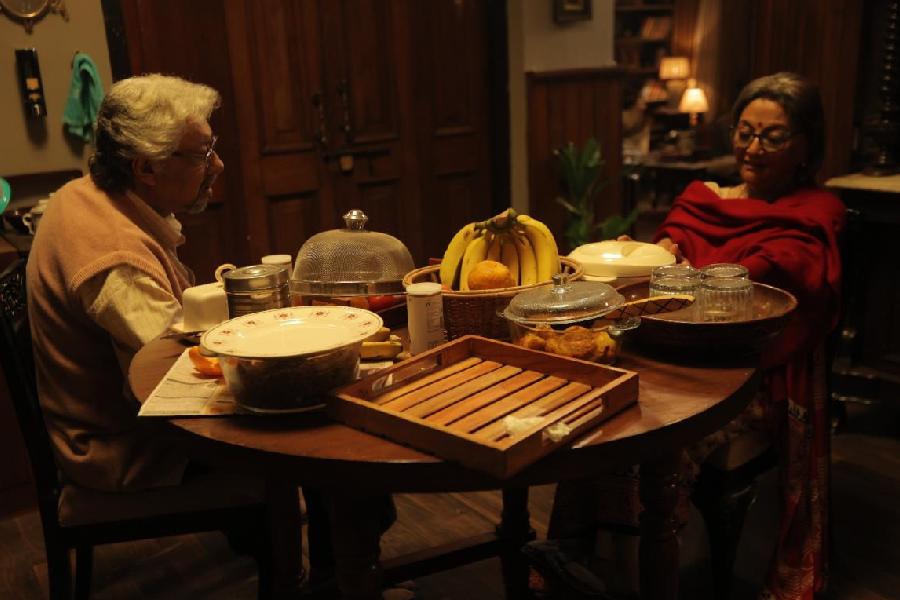
A moment from 'Ei Raat Tomar Amar'
Ei Raat Tomar Amaar also has a subtle sense of humour though the subject is sombre. How much did you both enjoy the film as actors?
Anjan: What I really liked was the fact that both had a side to themselves which they avoided. And all of it had humour… it is not that the wife is dying and the husband is going crazy. During the workshop, she (Aparna) did a little bit of rewriting on the script which was very important.
Aparna: This is also a chamber piece. In this film, our characters are not romancing each other. But there’s a tenderness. That’s so beautiful… the tenderness and the humour. She is not well but she is teasing him. There’s a kind of enjoyment of life. There’s mutual dependence and teasing each other and being unable to do without each other. All of that is real, tender, humorous, and sad. It has got a lot of mixed emotions which is also very sensitive. And this is a kind of film which audiences would like… if they want good films they have to see good films. If they want sensitive films, they have to see sensitive films so that directors and producers will be able to make those films and those films will become financially viable. It is also the audience’s responsibility to go to the cinema halls and watch these films.
Anjan: During KIFF, it was shown at Rabindra Sadan and there were 1,100 people. It was packed. There is an intelligent audience. If they make that effort, they will like it.
Aparna: Also, in this age of constant violence and all of that, a story about two people’s tenderness is so important. My character is ill and he is aging but we were not shown like that. There’s humour even in that. Anjan: I am not being modest but when I look back as an actor, and this I want to convey to the audience, they have seen Aparna Sen through the ages… a lot of films, great films, commercial films but her part was very difficult. She has not played the typical sick woman. She has to cough, laugh and dress up. There’s a layer of sickness and physicality. She is vivacious, she is fighting. It is very difficult to play such a character.Aparna: Interestingly, we were there for each other, from acting in the film to actually calling each other up to check if we were doing the scene well. As actors, we were mutually dependent on each other. We were playing off each other all the time. It is something that I was not able to do with many actors. This playing off each other is a very important thing.
Was that spontaneous or rehearsed?
Aparna: Totally spontaneous but also a lot of things… a level of trust, being comfortable with each other and having known each other for so long. That made it much easier.
The film captures intimacy very beautifully…
Anjan: Yes. That intimacy comes from trusting each other as actors. Despite Aparna Sen being such a big star, the level of comfort that she gave me… it would be difficult for me to do it as an actor. To be comfortable with intimacy is one of the greatest things about acting.
Aparna to Anjan: Remember how we did it in Juganta? We did a lot of workshops.
Anjan: Her first film proved to all of us that physical intimacy can be so beautiful. And one of the reasons why cinema in Bengal is suffering is because there are no good love scenes.
Aparna: It is not necessary to show intimacy by absolutely grabbing each other. In Juganta, I had told Anjan to just cross over Rupa. The physical act of crossing over her from the bed to get on to the floor is so casual. One has to be so comfortable to do that… there’s an exercise we have in theatre that we do with the co-actor. We fall backwards and we know that the actor will have our back. We are not going to hit the floor because our co-actor will have our back. That is the level of trust that Anjan and I share in this film.
Anjan: I don’t think many people have the palette to handle a good intimate scene here.
Aparna: In 36 Chowringhee Lane, what we did was after one of the love scenes, we had Debashree (Roy) wearing Dhritiman’s (Chaterji) shirt. It just indicates what happened before. In Apur Sansar, she finds a hairpin…it is the little things that show intimacy. It is not that you have to always grind each other’s lips.
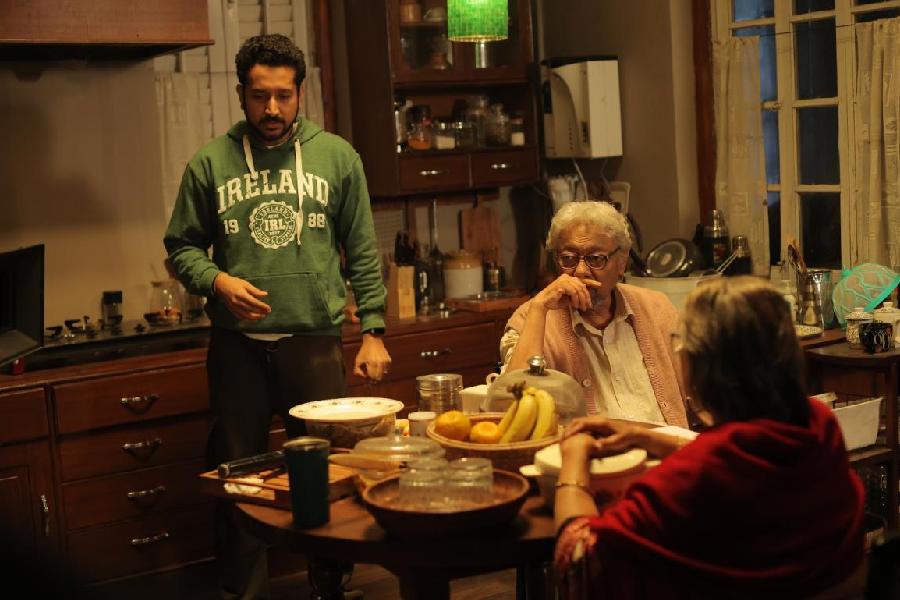
Parambrata Chattopadhyay directs Anjan Dutt and Aparna Sen
Why did you both say ‘yes’ to the film?
Aparna: One of the reasons was that Anjan was going to be my co-actor. I liked the story. The entire cast and crew is there but whatever is seen in the film is seen through our faces, our bodies and our gestures. The responsibility was a little daunting but at the same time challenging and exciting. But I insisted on having an actor that I trust.
Anjan: I wanted to act in a film with her. And the other thing is the script. Satyajit Ray once said that if you are a sensitive person, if you are intelligent no matter what you have… you have to have a good script and you cannot say that the market is insensitive. You jolly well be sensitive.
Aparna: Another thing that Satyajit Ray used to say is that if a film is not about human beings it is not about anything. This film is about human beings.
Most people were tearing up after the screening at KIFF. What were your goosebump moments in the film?
Anjan: I think a good film has to have a lump in your throat. I believe in that. Some people had it and some people were crying.
Aparna: For me, it was the last shot when Anjan goes outside the house to make a call. I found myself tearing up.
What do you admire about each other as directors and as actors?
Anjan: I always say that Aparna Sen is one of the best actor-directors in this part of the world. I have worked with some of the best and have auditioned for sensible people… Buddhadebda (Dasgupta), Mrinal Sen, Sudhir Mishra…
Aparna: That’s because he has only worked with guys! (Laughs)
Anjan: No, no. Even if I compare her with Mira Nair, I would say so. Also her scripts. The scripts she writes. It is not about being clever. It is about being humane.
Aparna: It is about creating moments. You have to create moments in a film. This was one of the early lessons that I got. Satyajit Ray had read 36 Chowringhee Lane as a script. After I made the film, he asked me how the film turned out. I told him that there are many flaws. But he said, ‘There will be flaws. It is your first film. But were you able to create moments or not?’ A film is not about a whole lot of flawless shots put together. A film is about a moment that is created with sometimes even flawed shots. Doesn’t matter. But if the moment is created that is what people will take back with them.
Anjan: I feel she should act a little more. Directors should come up with great scripts for her…
Aparna: I want to be sure that the director knows his or her job. I am very aware of the flaws. I can’t just focus on my character. The flaws with shots and sets bother me to no end. I do not want to put on my director’s cap when I am acting as it is not my business but I can’t keep quiet. What do I do? Sometimes I say and sometimes I suffer in silence.
Anjan: I remember this very well. Even on a Mrinal Sen set, she once got the curtains changed because she didn’t like the colour… (Laughs)
Aparna: The set is important. Cinema is a collaborative process... it is not just about the actors.
How was Parambrata as a director?
Aparna: Param was very sure of himself and he trusted us just like we trusted him.

